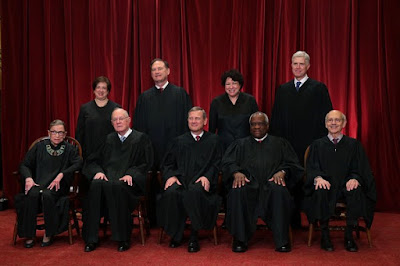WASHINGTON — Saying that a capital trial in Georgia may have been marred by a juror’s racism, the Supreme Court on Monday gave a death row inmate there a fresh chance to argue that he should receive a new trial.
The court’s opinion was brief and unsigned. Justice Clarence Thomas, joined by Justices Samuel A. Alito Jr. and Neil M. Gorsuch, filed a lengthy dissent accusing the majority of “ceremonial hand-wringing.”
The inmate, Keith Tharpe, was convicted of killing his estranged wife’s sister, Jaquelin Freeman, in the process of ambushing, kidnapping and raping his wife. He was convicted and sentenced to death in 1991.
Seven years later, a white juror, Barney Gattie, signed an affidavit explaining his reasoning. He said he had drawn a distinction between Mr. Tharpe and his victim, both of whom were black.
“The Freemans are what I would call a nice Black family,” Mr. Gattie wrote. “In my experience I have observed that there are two types of black people. 1. Black folks and 2. Niggers.”
“Because I knew the victim and her husband’s family and knew them all to be good black folks, I felt Tharpe, who wasn’t in the ‘good’ black folks category in my book, should get the electric chair for what he did,” Mr. Gattie wrote.
“After studying the Bible,” he added, “I have wondered if black people even have souls.”
Mr. Tharpe sought to reopen his case based on the affidavit, but state and federal courts ruled against him. The United States Court of Appeals of the 11th Circuit, in Atlanta,
stated that “Tharpe failed to demonstrate that Barney Gattie’s behavior ‘had substantial and injurious effect or influence in determining the jury’s verdict,’ ” quoting
a Supreme Court decision.
The majority opinion on Monday said the appeals court should reconsider its decision not to hear Mr. Tharpe’s appeal. “Gattie’s remarkable affidavit — which he never retracted — presents a strong factual basis for the argument that Tharpe’s race affected Gattie’s vote for a death verdict,” the opinion said.
In a similar case decided in March,
Peña Rodriguez v. Colorado, the
Supreme Court ruled that courts must make an exception to the usual rule that jury deliberations are secret when evidence emerges that those discussions were marred by racial or ethnic bias.
The majority opinion on Monday noted that Mr. Tharpe faces several additional legal hurdles. But it said the appeals court had erred in concluding that there was no question of prejudice in the case.
In a 13-page dissent in the case, Tharpe v. Sellers, No. 17-6075, Justice Thomas wrote that “the opinions in the affidavit are certainly odious.” But he said the majority had ignored controlling legal principles in order to make a statement.
“In bending the rules here to show its concern for a black capital inmate, the court must think it is showing its concern for racial justice,” Justice Thomas wrote. “It is not.”
Mr. Tharpe was bound to lose in the long run given the difficulty of challenging state capital convictions in federal court, Justice Thomas wrote. He added that Mr. Gattie had been drinking when he signed the affidavit and later submitted a second one saying he had not voted for the death penalty based on Mr. Tharpe’s race.
“The court must be disturbed by the racist rhetoric” in the first affidavit, Justice Thomas wrote, “and must want to do something about it. But the court’s decision is no profile in moral courage.”
“By remanding this case to the court of appeals for a useless do-over, the court is not doing Tharpe any favors,” he added. “And its unusual disposition of his case callously delays justice for Jaquelin Freeman, the black woman who was brutally murdered by Tharpe 27 years ago. Because this court should not be in the business of ceremonial hand-wringing, I respectfully dissent.”
⚑ | Report an error, an omission, a typo; suggest a story or a new angle to an existing story; submit a piece, a comment; recommend a resource; contact the webmaster, contact us:
deathpenaltynews@gmail.com.
Opposed to Capital Punishment? Help us keep this blog up and running! DONATE!
"One is absolutely sickened, not by the crimes that the wicked have committed,
but by the punishments that the good have inflicted." -- Oscar Wilde












